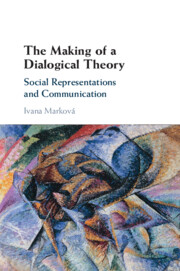Book contents
- The Making of a Dialogical Theory
- The Making of a Dialogical Theory
- Copyright page
- Contents
- Figures
- Acknowledgements
- Introduction
- Part I The Development and Diversification of the Theory of Social Representations and Communication
- Chapter 1 Socio-political Sources of the Theory of Social Representations
- Chapter 2 A Political Refugee in Paris
- Chapter 3 The ‘Age of Intellectual Innocence’ in Psychoanalysis (1961)
- Chapter 4 The Durkheimian in Psychoanalysis (1976)
- Chapter 5 The ‘Great Smoky Dragon’
- Chapter 6 Pseudo-dialogues and Building Bridges
- Part II The Dialogical Perspective of the Theory of Social Representations and Communication
- Afterword
- References
- Index
Chapter 2 - A Political Refugee in Paris
from Part I - The Development and Diversification of the Theory of Social Representations and Communication
Published online by Cambridge University Press: 22 June 2023
- The Making of a Dialogical Theory
- The Making of a Dialogical Theory
- Copyright page
- Contents
- Figures
- Acknowledgements
- Introduction
- Part I The Development and Diversification of the Theory of Social Representations and Communication
- Chapter 1 Socio-political Sources of the Theory of Social Representations
- Chapter 2 A Political Refugee in Paris
- Chapter 3 The ‘Age of Intellectual Innocence’ in Psychoanalysis (1961)
- Chapter 4 The Durkheimian in Psychoanalysis (1976)
- Chapter 5 The ‘Great Smoky Dragon’
- Chapter 6 Pseudo-dialogues and Building Bridges
- Part II The Dialogical Perspective of the Theory of Social Representations and Communication
- Afterword
- References
- Index
Summary
2. With the benefit of hindsight, Serge Moscovici tried to reflect on what had motivated him to develop the theory of social representations. Socio-political and intellectual resources that underlay his thinking were complex. They were determined by events during the War and its aftermath, as well as by his personal and interpersonal experiences. In contrast to social psychological studies in the 1950s which were preoccupied with the study of attitudes and small groups, Moscovici was interested in urgent global issues such as the impact of science and technology on historical changes in society, the role of masses, conflicts, and the construction of social knowledge. He believed that social psychology would be able to respond to these challenges.
The two masters who had a tremendous impact on Moscovici’s career during the first years of his research in Paris were the psychiatrist and psychoanalyst Daniel Lagache and the philosopher of science Alexandre Koyré. They re-orientated Serge Moscovici’s life and he called them his two fathers.
Moscovici’s choice to study social representations of psychoanalysis was inspired by several intellectual reasons and coincidences. Above all, he thought that psychoanalysis would be suitable subject matter to explore the transformation of ‘scientific’ or professional knowledge into daily knowledge.
- Type
- Chapter
- Information
- The Making of a Dialogical TheorySocial Representations and Communication, pp. 26 - 44Publisher: Cambridge University PressPrint publication year: 2023

